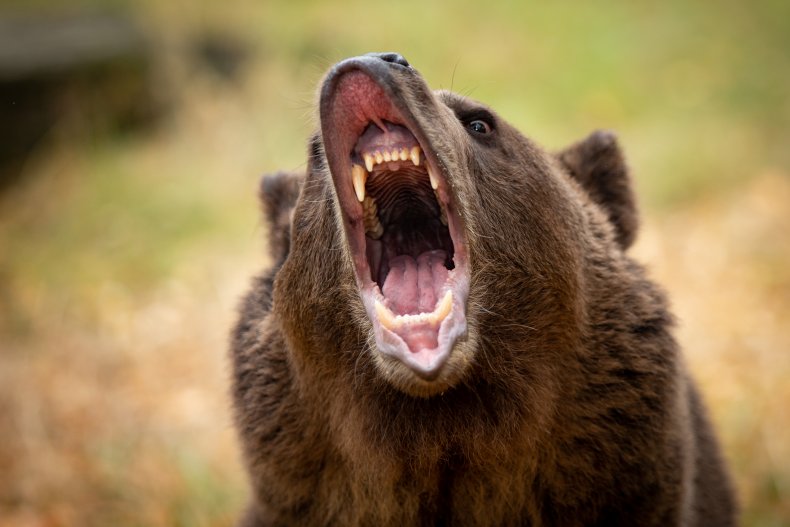Bear Attacks Alaska Boy, 9, As He Hunts for Moose
A bear has attacked a 9-year-old Alaskan boy who was out hunting for moose with a relative.
The boy had been hunting with a family member in the Palmer Hay Flats area off the Glenn Highway when the brown bear attacked, Alaska State Troopers said in a statement.
The bear, who had a cub with it, began to maul the boy, causing “serious injuries.” The adult shot and killed the bear.
State troopers and Alaska Wildlife Troopers arrived to the scene on September 20 at 6.37 p.m and transported the boy to a hospital in Mat-Su.
It is not clear what circumstances lead up to the attack, but bears are notorious for being fiercely protective of their cubs. As the bear responsible for the attack had a cub nearby, it is possible it attacked to defend territory and protect its young.

A stock photo shows a grizzly bear baring its teeth. A bear with a cub attacked a 9-year-old boy while he hunted for moose.
Warren A Metcalf/Getty
At press time, no further details on the boy’s condition had been released.
Officials continued their investigation into the incident on September 21, interviewing other witnesses who saw it unfold.
Wildlife officials have sent out search parties for the cub, which was uninjured in the incident. They searched for the cub by land and helicopter but have not yet had any luck.
The cub will be euthanized if it is found.
“Unfortunately bear cubs beyond the first few weeks/months of life outside the den do not do well in captive situations,” Todd Rinaldi, regional management coordinator for the Alaska Department of Fish and Game, told the Anchorage Daily News.
There are an estimated 40,000 brown bears—also known as grizzly bears—living in the Alaskan wild. Brown bears can be found throughout Alaska except in the Southeast, on the islands south of Frederick Sound, the Aleutian Chain west of Unimak, and the Bering Sea islands.
Brown bears are not protected in Alaska, as the population is widely distributed and healthy. State-managed hunts are sometimes carried out in order to manage their numbers around densely populated areas. As densely populated areas expand, conflicts with native wildlife become more likely.
Bears will not usually target humans unless they feel threatened or provoked. Bears used to humans may be bolder, and more prone to attack.
Between 2000 and 2017, there were eight fatal bear attacks in Alaska. The state accounted for 29 percent of the total bear attacks to occur in the U.S during this period.
Newsweek has contacted the Alaska State Troopers for a comment.






